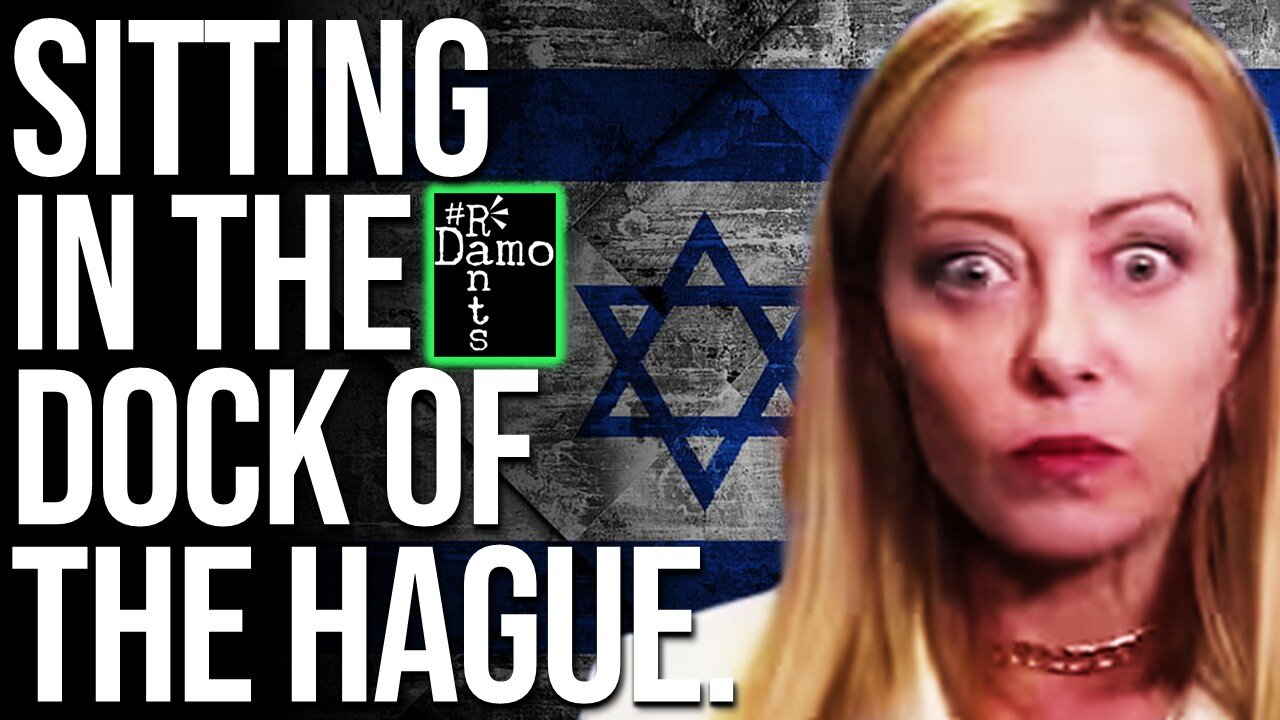Premium Only Content

Meloni Brushed Off Gaza War Crimes — But The Hague Didn’t
Right, so it turns out the phrase “Never Again” has ended up coming with caveats and that statement will no doubt draw most people’s minds to Israel. But Italy’s Prime Minister Giorgia Meloni has just discovered what happens when a European leader realises that phrase might finally apply to them and there’s no trace of irony that a far right neo-fascist like her has ended up falling afoul of international law over this first where Europe is concerned. Italy’s prime minister now shares an honour no Western politician wanted: being the first to have her name filed at The Hague for complicity in Israel’s genocide of Gaza. It’s not for saying the wrong thing, but for exporting the wrong parts to the wrong war, a war that in this case has already plausibly been found to be genocidal. The government insists it’s all “political,” which is one way of describing the act of profiting from mass death while calling it diplomacy I suppose. But until now, the ICC mostly kept itself busy by judging Africans and scolding Arabs, while sparing its own so to speak. It’s been a long time coming and with one European leader now facing complicity charges, how many more can and should follow?
Right, so Giorgia Meloni says the charge of aiding genocide is “political.” But the politics she means are the contracts, licences, and profits that made it possible and her role in that.
It began with what should have been a routine television appearance. Sitting beneath the bright studio lights of RAI, Meloni tried to sound composed. But she confirmed that she, Defence Minister Guido Crosetto, Foreign Minister Antonio Tajani, and Leonardo CEO Roberto Cingolani had been formally named in a complaint to the International Criminal Court for complicity in genocide.
“It’s unprecedented,” she said — and on that point, she was right. A Western head of government admitting live on air that she is accused of helping enable genocide is something the world had never seen.
The complaint, hich was filed on 1 October and signed by around 50 lawyers, academics, and human-rights figures, accuses the Italian government of aiding Israel’s destruction of Gaza through arms exports, diplomatic protection, and political alignment. It comes in the same week that Spain announced its own ICC filing over Israel’s treatment of the Sumud Flotilla activists seized at sea. Europe’s moral immunity has finally started to fracture.
Meloni’s response followed a pattern now familiar across Western capitals: deny, deflect, redefine. She called the case “politically motivated,” claimed that Italy had authorised no new weapons for Israel since October 2023, and insisted that such allegations “have no precedent in world history.” What she did not deny was that the contracts exist, the parts were delivered, and the bombs still fell.
Italy called it law. But the world is finally calling it complicity.
The filing is not yet a prosecution. It is a denuncia — a formal request for the ICC Prosecutor to open a preliminary investigation. But the language is direct. The signatories accuse Italy of knowingly facilitating acts that meet the Genocide Convention’s threshold: mass killing, starvation, and destruction of civilian life.
Trade data and export licences tell the story. United Nations figures show Italian exports of arms and ammunition, parts, and accessories to Israel worth just over six million US dollars in 2024. Investigations have confirmed that deliveries continued under pre-existing contracts, despite the supposed freeze. It has been calculated that total Italian arms licences at € 7.6 billion that year — the highest level in a decade.
And at the centre of all of this stands Leonardo S.p.A., the partly state-owned aerospace and defence giant that produces avionics and structural components for the F-35 fighter jet and radar systems through its Israeli-linked subsidiary RADA. Not to be confused with the drama school.
The complaint’s argument is simple: when a government continues to supply the means of destruction after evidence of genocide is public, the line between ally and accomplice disappears and when you consider Spain having implemented a full arms embargo on Israel now, Meloni’s excuses dry up in comparison.
Under Article 25(3)(c) of the Rome Statute, anyone who aids or abets a crime “for the purpose of facilitating its commission” is criminally liable. Intent can include wilful blindness — continuing to act despite knowing what one’s actions enable.
Italy is an ICC member, so jurisdiction is clear. The only shield is complementarity, the rule that the Court steps in only when national authorities are unwilling or unable to act. Rome has shown neither willingness nor capacity to investigate its own ministers or the executives of its state-controlled arms firm. Unless that changes, the file submitted surely remains admissible therefore.
For the ICC Prosecutor, or his deputies right now as the case is, the question is no longer a technical one. It is existential. Proceeding would end the perception that Western leaders sit above international law as the lack of litigation against the West has seemed to imply. Declining would confirm that as fact. So their next move will be well worth watching.
Meloni’s legal defence rests on wording. She insists Italy approved no new exports after October 2023. Yet the F-35 programme and existing framework contracts kept parts flowing regardless of new licences. Italian-made components continued to feed a global supply chain that arms Israel by default.
Law 185 of 1990 prohibits exporting weapons to states engaged in conflict or responsible for human-rights violations. Successive governments have hollowed that out with exemptions for multinational programmes. The result is a loophole so wide an F-35 can literally fly through it.
This isn’t diplomacy. It’s evidence. But this is also international law we’re talking here, not Italian domestic law.
The figures alone contradict Meloni’s denial. Every shipment, every invoice, every component delivered after October 2023 is a piece of material proof. The government’s claim of political persecution collapses against its own trade data.
But Italy is not alone either and if this prosecution pushes forward, what precedent does it set for others? Across Europe, governments are discovering that the Gaza genocide has turned long-standing alliances into legal risks. Germany remains Israel’s second-largest arms supplier after the United States. The Netherlands continues to host F-35 logistics hubs. France faces a domestic lawsuit over component exports. And Spain, the first EU state to recognise Palestine in practical terms, has filed its own ICC case over Israel’s abuse of flotilla detainees.
The United Kingdom’s position is no less precarious. For all of Downing Street’s rhetorical distance from Benjamin Netanyahu’s government, Britain remains one of Israel’s most dependable suppliers of military components and intelligence support. According to official export data, UK arms licences to Israel total hundreds of millions of pounds since 2015, including parts for F-35 aircraft, drones, and targeting systems now deployed over Gaza. The government insists that these sales are “under constant review,” but it has only ever suspended a handful, issued more following those suspensions and arms sales peaked last month at their highest since July of last year, even as UN agencies confirmed evidence of genocide and mass starvation. London’s complicity goes further than commerce: RAF surveillance flights over the Eastern Mediterranean from RAF Akrotiri have fed intelligence directly to Israeli operations, and British officials have lobbied within the G7 to block embargo proposals. Under the same legal principles now ensnaring Meloni’s Italy, the UK’s policy of political and logistical cover for a genocidal war could and should one day draw its own ministers into the dock, something many of us here in the UK would love to see.
The Meloni complaint sets the benchmark now. Once the ICC accepts the idea that facilitating genocide through supply chains constitutes complicity, every exporter is on notice. Ministries that once signed licences as routine paperwork now confront personal liability. In private, European officials describe the case as “contagious.” In legal terms, that is precisely what accountability looks like.
Inside Italy, the political reaction has been predictably defensive. Government loyalists call the complaint an attack on sovereignty. But outside Parliament the narrative has shifted. Dockworkers in Genoa, Livorno, and Naples have refused to load ships suspected of carrying not just arms to Israel now, but anything. Students occupy universities. Unions and clergy march together demanding an embargo.
The seizure of the Sumud Flotilla, with several Italian nationals among the detained, has sharpened the anger. Meloni’s government expressed “concern” but reaffirmed Israel’s “right to self-defence.” To the protesters, that sounded like complicity spoken out loud.
Public pressure now forms part of the legal context. Under complementarity, citizen protests demonstrate willingness for domestic accountability. The executive’s refusal to investigate its own conduct becomes evidence of unwillingness — precisely the condition that invites ICC intervention.
The inclusion of Leonardo’s CEO, Roberto Cingolani, takes the case beyond politics into the heart of Europe’s arms economy. Leonardo is not just another contractor. The Italian state is its majority shareholder, and its leadership answers to the same ministries under ICC scrutiny.
If the Court recognises corporate executives as potential accomplices when their companies operate under state authorisation, it could redefine global defence accountability. The distinction between government policy and private profit would evaporate.
Leonardo’s numbers illustrate why that matters. Annual revenue exceeds € 13 billion; exports reach more than 80 countries. The firm’s share price has risen throughout the Gaza campaign. For prosecutors, that profit curve is not an economic detail — it’s the timeline of complicity.
Italy’s main broadcasters gave Meloni’s admission a few cautious headlines, then moved on to domestic tax news. When the ICC pursued African or Russian figures, entire programmes were dedicated to it. When the subject became a European leader, coverage evaporated.
That silence is not editorial fatigue; it is structural bias. Western journalism treats accountability as universal only until it points homeward. The result is a public shielded from its own government’s actions.
Independent and foreign media have filled the gap with documentation that mainstream media ignored: shipment data, subsidiary contracts, ministerial statements. Their reporting ensured the evidence existed in public before the Court ever saw it. Without that, there would be no case. Such is the importance of real journalism and not the performative drivel we put up with in mainstream western discourse.
For the ICC, the decision is loaded with risk though, not that it should be. Prosecuting a Western leader would prove its independence; refusing would confirm its capture. Either path will define its credibility for a generation.
If the Court proceeds, it must request cooperation from Italian ministries, defence contractors, and banks — a move that would expose correspondence and export records across the continent. Governments in Berlin, Paris, and London would instantly recognise their own reflection in thise documents. If it declines, the message to the world is that the law stops at Europe’s borders.
Therefore this case is more than legal process; it is the collapse of an old mythology. Europe has long seen itself as the moral custodian of humanitarian law — the teacher, not the pupil. The Meloni complaint reverses that. The continent that wrote the rules now stands accused of breaking them.
Europe’s posture on Gaza — condemning “disproportionate” attacks while continuing arms trade — embodies the contradiction. The language of restraint co-exists with the logistics of destruction. By confronting Europe with the word genocide, the complaint drags the hypocrisy into the open. It asks a simple question: can those who created the principle of “Never Again” live with violating it?
When the state commits crimes through policy, everyone paying into the public purse finances them. The ICC targets individuals, but moral responsibility is collective. Italians know this; that is why the streets keep filling up there as they have been doing nationwide in recent days and weeks. The demonstrations are not just about Gaza. They are about reclaiming a sense that the law still applies to the powerful.
If the ICC advances, it will be because citizens and lawyers forced the issue. If it retreats, the documentation will still exist, waiting for another venue and the ICC might as well shut up shop for its credibility will be worth. Either outcome erodes the assumption that Western democracies are beyond judgment though.
The Meloni complaint amplifies a trend already underway. South Africa, Nicaragua, and Bolivia have filed or supported genocide cases against Israel. The Global South no longer asks Western permission to invoke international law. Now Europe’s own citizens are joining that wave from within.
Should the ICC stall, new tribunals will rise — regional courts, BRICS mechanisms, universal-jurisdiction filings in Latin America, it’ll happen somewhere. The more the West shields itself, the more others build systems without it. The “rules-based order” is collapsing under the weight of its own exemptions.
Realistically, Meloni may never stand trial. Political pressure, diplomatic deals, and procedural delays might bury the file for years. People won’t be happy about that though. But the act of naming her has already changed the landscape. For the first time, Western leaders have been placed inside the legal frame of genocide, not exempted from it.
Every export licence signed from this point on carries a shadow. Every defence minister knows their decisions could one day appear in an annex at The Hague. That awareness — the end of assumed immunity — is the beginning of accountability.
The image of Meloni in that RAI studio will remain the turning point. A prime minister explaining to her own electorate that she stands accused at The Hague. The indignant tone could not mask the reality: the era of untouchability is ending.
So from now on, the question will follow every Western leader who signs an arms deal or blocks a ceasefire. Could this be the next referral? The Meloni case has made the unthinkable thinkable.
History moved when she said the quiet part aloud.
The complaint against Giorgia Meloni exposes the gap between principle and practice, between the laws Europe wrote and the wars it fuels. Whether the ICC proceeds or not, the evidence still stands: Italian weapons, Italian contracts, and Italian political protection have sustained Israel’s assault on Gaza.
Justice often begins not with a verdict but with a record. This is that record. Meloni called the case unprecedented; she was right. But the precedent is not the accusation — it is the accountability it implies. From now on, every Western government that aids Israel’s war must calculate not only the profits but the potential prosecution. And that’s a gamechanger.
For more on the domestic fallout in Italy, especially following the capture by Israel of the Sumud Flotilla, allowed to happen under the watch of two Italian warships, check out this video recommendation here as your suggested next watch.
Please do also hit like, share and subscribe if you haven’t done so already so as to ensure you don’t miss out on all new daily content as well as spreading the word and helping to support the channel at the same time which is very much appreciated, holding power to account for ordinary working class people and I will hopefully catch you on the next vid. Cheers folks.
-

DeVory Darkins
16 hours ago $28.95 earnedDemocrats drop SHOCKING Update regarding ICE Agents - Myron Gaines
104K49 -
 LIVE
LIVE
Mally_Mouse
1 hour ago📣Telescreen Talks - LIVE!
123 watching -
 21:24
21:24
Professor Nez
1 hour ago🚨WOW! Trump got EMOTIONAL when RFK Jr. Said THIS!
1199 -
 LIVE
LIVE
Jeff Ahern
54 minutes agoNever woke Wednesday with Jeff Ahern
88 watching -
 1:06:21
1:06:21
Timcast
3 hours agoLiberals DEFEND Nazi Tattoo On Communist Democrat Senate Candidate, ITS A CULT
120K138 -
 LIVE
LIVE
Side Scrollers Podcast
2 days ago🔴FIRST EVER RUMBLE SUB-A-THON🔴DAY 3🔴100% REVENUE HELPS CHANGE CULTURE!
1,286 watching -
 25:57
25:57
The Kevin Trudeau Show Limitless
5 hours agoThe Sound Of Control: This Is How They Program You
3.4K4 -
 LIVE
LIVE
Dr Disrespect
4 hours ago🔴LIVE - DR DISRESPECT - BATTLEFIELD 6 KILL CHALLENGE - VS VISS
1,235 watching -
 11:32
11:32
Sponsored By Jesus Podcast
3 days agoWhat “Speaking the Truth in Love” REALLY Means | Tension of Grace and Truth
10.6K6 -
 29:40
29:40
Paul Barron Network
2 days ago $0.38 earnedCrypto ETFs Launching... Even With Government SHUT DOWN?! 🤯 Grayscale INTERVIEW
7.92K